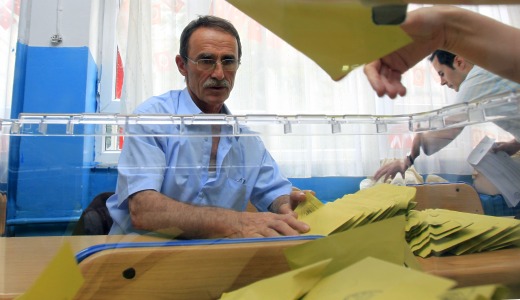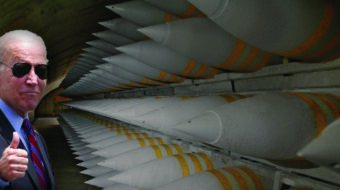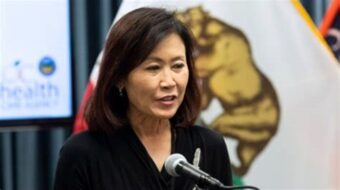
On Sunday June 12, Turks voted for members of their 550-seat parliament. As predicted, the center right and moderately Islamist Justice and Development Party (AKP) of Prime Minister Recep Tayyip Erdoğan achieved a majority of seats. But the AKP fell short of the two-thirds majority that would have allowed the prime minister to easily forge ahead with his plan to transform Turkey’s political system into a presidential one instead of the current one in which the Prime Minister is the real leader of the country and is chosen by a majority of the parliament.
With a high turnout of about 87 percent, Turkish voters gave Erdogan’s AKP about 50 percent of the vote, which is slightly up from the last election in 2007, but only 326 seats in parliament, down from the previous 341. This means he cannot simply push through the constitutional changes he wants without negotiating with the other parties.
Coming in second was the centrist Republican People’s Party (CHP), the lineal descendent of the party set up by Mustafa Kemal Atatürk, founder of the modern Turkish Republic, with about 26 percent of the vote. With 135 seats, 23 more than were elected in 2007, CHP will be the second force in the legislature.
In third place came the right-wing Nationalist Movement Party (MHP), with 13 percent of the vote and 53 seats, down 18 seats from the previous parliament.
A number of smaller parties, mostly right wing, failed to get into parliament.
On the left, both the Turkish Communist Party (TKP) and the Turkish Labor Party (EMEP) ran candidates, the latter in a joint effort with candidates nominated as independents by the Kurdish People’s Party (BDP). Both TKP and EMEP more or less held their own, with about .14 percent and .07 percent of the vote respectively and no members elected to parliament, but the BDP registered quite a triumph, for the first time electing 36 deputies to parliament from Kurdish speaking areas of Southeastern Turkey. In this election and for the first time, it was also no longer illegal to campaign in languages other than Turkish.
The left had campaigned on a platform of opposing the right-wing, pro-corporate policies of the current government, defending labor and all people’s rights, and defending the rights to national identity and use of language and culture for the Kurdish people. They also expressed support for the Palestinian people and opposition to the actions of NATO, of which Turkey is the only Asian member state.
The EMEP had strongly denounced the plan to modify the constitution and turn Turkey into a presidential republic, as representing a danger of even greater repression than the people of Turkey currently face. The current constitution, imposed by the military after a 1980 coup d’état, is secularist and authoritarian. EMEP does call for a constitutional change which would not “impose any ideology [or] describe the nation and citizenship on an [ethnic] basis”
This refers to the long and bloody war that has been going on in Eastern Turkey between the Turkish military and Kurdish guerillas of the Kurdish Workers’ Party. Turkish law had, for many years, sharply restricted the rights of Kurds to use their own language or have their own media and literature, and for a long time the people in power in Ankara basically denied that the Kurdish people as such even existed in Turkey. Journalists and activists who have called for freedom for the Kurds have been jailed or assassinated. In recent years, there have been some moves toward a negotiated solution of the Kurdish issue, which the Turkish left wishes to see turned into full-fledged negotiations for a peaceful settlement.
In recent years, Turkey has been playing a higher profile role in regional and international issues; the AKP victory in the election is predicted by various commentators to permit the continuation of the development of that role.
Photo: Turkish election officials count the envelops from a ballot box shortly after the end of voting at a polling in Istanbul, Sunday, June 12, 2011. Turkey’s ruling party sought a third term in elections Sunday, aiming to build on economic and diplomatic advances in recent years as well as introduce a new constitution it says will make the country more democratic. (AP Photo/Thanassis Stavrakis).












Comments